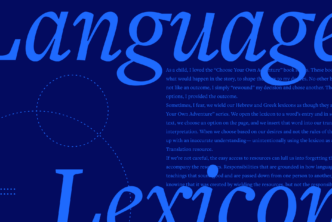Every year new students walk into classrooms ready to build upon their first-year biblical language skills by learning how to exegete the Hebrew or Greek text. They are taught how to examine the nuances of words, the rules of grammar. They discover the complexities of manuscript variation, genre, historical context, and the proper use of resources. They are then taught to pull all that data together into an interpretation, usually culminating in a lengthy exegetical research paper that showcases their newly acquired skills.
But for many students, learning the exegesis process is more than learning how to wield the biblical languages carefully and skillfully. For them, the exegesis paper is actually a place where academia and their spiritual lives come into conflict.
You may be that student. You may be teaching those students. I have been that student. And I am that teacher. I have some advice and comfort for both students and teachers.
Crises of faith
Just as in other classes, exegesis classes can be places where academic endeavors expose weak areas of your spiritual formation as a student.
When you as a student learn exegetical skills, for example, you may learn that the meaning of Hebrew and Greek words are not as cut-and-dried as you’ve been previously led to believe. You may learn that your pastor’s favorite Bible verse does not mean what he says—because the language’s grammar just does not work that way. You may learn that the way you were taught to understand the inspiration and infallibility of the Bible did not take into account all the complicated issues of textual criticism, of the variants in the manuscript traditions of the two Testaments. You may hear your professors explain how an interpretation you have always held to may not be accurate, because that interpretation does not take into account the complex genre issues evident in the text. You may learn that certain verses could be interpreted differently based on how one evaluates their historical context. And, you may learn that the resources your pastor often cites are not reliable, because they misunderstand how languages works.
Any one of these can cause concern, but when added together, they can lead to a crisis of faith. Such crises of faith are ultimately not caused by the seminary classroom, but by weak areas within one’s spiritual formation. Some students enter their exegesis classrooms having been taught by their church—people they love dearly and who love them dearly—that certain secondary teachings of the faith, not matters of orthodoxy, are taught so clearly by the biblical text that to doubt them is to sin. Exegesis class then reveals that their certainties are not all as justifiable as they were taught.
The Bible is a mode of communication that was given to and through God’s people in days long past. Ultimately, “exegesis” means learning how to hear the words clearly and with as little miscommunication as possible. But since the texts were given to people in past millennia and in ancient languages, miscommunication can happen. We teach exegesis to minimize miscommunication.
Miscommunication may be unintentional or intentional. Many people only repeat the miscommunications they have heard, not knowing anything different. Others, though, are so afraid of having their certainty questioned that they choose not to question what they believe and listen only to those with whom they already agree. And many (unintentionally or intentionally) fail to acknowledge areas where the meaning of a given biblical text is legitimately debatable.
Facing the fear of losing certainty—realizing they may have believed miscommunications—can be very frightening. Students facing this loss of certainty may feel uncomfortable at best or unmoored at worst. Some will respond out of fear.
Student stories
I once saw a student argue with a professor in the middle of class about an interpretation of a verse. The professor carefully explained the linguistic details, demonstrating that there was a limit on what the verse could mean—and that the student’s beloved, common interpretation was beyond that limit. Though the professor spoke with grace toward those who hold the erroneous view, the student spoke loudly and rashly. He was responding in fear to the loss of certainty.
While a student grader, I often graded papers that concluded the late date of the Exodus (1250-ish BC) was incompatible with orthodox Christianity. These students, sadly, had poor exegetical skills, and they failed to explain how that particular view made one unorthodox—in other words, a heretic. (Though some have strong opinions on the date of the Exodus, it is not a matter of orthodoxy.) I was especially surprised, because I knew their professor. Their professor actually holds to the the late date of the Exodus—the view those student were condemning! He talks about it in his class, and he explains very carefully the exegetical research that supports it. He is also very graceful towards the early date view of the Exodus (i.e., 1446 BC). These students were so fearful at having their certainty challenged that they chose to ignore the exegetical skills they were taught, along with the rules of how languages work, in order to condemn a gracious brother in Christ for an interpretation not essential to faith in Christ. They wrote out of fear.
I once met a student at another school who was so fearful of writing an exegesis paper that would question her certainty, that she instead turned in a paper discussing the theology of evangelism. She had (inaccurate) confidence that her exegesis professor could not fail a paper on evangelism. This student was so fearful of losing certainty that she avoided the assigned work all together.
Not all students show their stress outwardly. Some quietly drown as the certainty they have been clinging to sinks amidst the waves of important information they’re receiving for the first time. They find themselves unsure whether they should just let go of their certainty; they wonder if there’s anything else to hold on to.
Cautionary tales
Each of these reactions originate from a fear of uncertainty. Some who face this crisis of faith will later become cautionary tales. They will be object lessons for those who believe that education is incompatible with Christian faith. I do not dismiss this concern: some students walk away from the faith after attending seminary.
But learning to ask careful questions of the biblical text certainly need not cause a crisis of faith.
To repeat, the primary reason students have such a crisis is that they enter the classroom with weak areas in their spiritual formation. In my experience, this weakness doesn’t necessarily consist in ignorance: many of the students I know who have faced the challenge of losing false certainty have been quite knowledgeable even before they entered the exegetical classroom.
Instead, this spiritual weakness often stems from churches which teach their people that secondary issues—those that do not have to do with Christian orthodoxy—are just as certain and important as the fundamentals of orthodox faith. Whether they intend to do this or not, some pastors ignore difficult questions and the ambiguities sometimes present in the biblical languages. They set up their young people poorly for exegetical education. Is it any surprise that some will eventually learn that some of their certainty is misplaced?
But in other situations, this spiritual weakness stems from a lack of attentiveness on the part of the student. Some students were presented with the complexities but failed to recognize and receive them.

Counsel and comfort
What do you do when you feel that your faith is faltering because of your growing skills in biblical exegesis? When you feel that learning about one more textual variant or interpretive difficulty will send your faith careening off the ledge?
1. Pray
I don’t mean that you must repeat quaint platitudes or treat prayer like a band-aid. I mean that you re-teach yourself about where your faith is directed. The Bible is his revelation and his Word, but it is not God. So pray to the one you are trying to maintain your faith in. The more you know God, the more you know how to hear God, the less your faith will falter.
2. Talk to your professor
You are not the first—nor will you be the last—to find your faith faltering in the classroom. We have a certainty problem in the church today: we are taught by well-meaning people that there is more certainty in biblical interpretation than there is. Your professor has seen it before. That professor, I assure you, has walked with students before through the exact same questions. Honestly—many of your professors were in your shoes when they were students.
3. Ground yourself in orthodoxy
Orthodoxy is the collection of the key elements of our faith, the doctrines that Christians throughout history have agreed upon. These are things that together we, along with the great cloud of witnesses (Heb 12:1), hold on to even when we doubt. Learn the historic creeds. The creeds help ground us in what is important. They ground us in who our God is. By defending the existence of many uncertainties in Scripture and in theology, I in no way wish to undermine the great Christian truths, such as the incarnation of Christ, his death for our sins, and his resurrection.
4. Allow yourself to ask questions
It is common in certainty-faith cultures to treat all questions as equivalent to doubt. They are not. Questions are opportunities to learn more about the God we love and who loves us. The biblical writers frequently ask questions (see Ps 73; Eccl; Job). Consider how Jesus answered the questions of those seeking him.
5. Give yourself grace
Your fear and struggle with certainty is not a sign of failure. It is an opportunity for spiritual formation. Do not compare yourself to that seemingly “super Christian” in your class who projects no fear or doubt. You are on your own faith journey, not theirs.
6. Do the work
Lean into the very thing that makes you fearful. By the grace of God, face your fears. Amidst the things that make you tremble are also the things that can bring relief. Sometimes unlearning false certainty will show you how those false certainties were oppressing you—and will lead you to even better certainties.
7. Give yourself permission to pause
At times, it may be needed and appropriate to drop a class for the sake of your spiritual health. Don’t do this in an attempt to hide from your challenges, but in order to take time to surround yourself with the church—as others help you shore up your faith and strengthen your ability to face uncertainties. Then, when you are stronger, jump back into the challenge.
Teaching struggling students
Now, teachers and professors, both new to this challenge and old, how do you walk alongside your students as they face new uncertainties?
1. Pray for your students
We are called upon to teach them skills, but it is the Holy Spirit who shapes and forms them spiritually. Pray for all your students, remembering that many struggle in silence. Ask for God to guide you as you help equip those he has entrusted to you.
2. Walk with them as a sister or brother in Christ
While you are their professor, you are first and foremost their sister or brother. Talks about the academic aspects of the class (grades, deadlines, etc.) should always remain secondary to their spiritual formation. Care more about their spiritual formation than their grades and your metrics.
3. Give the students grace
With academic and accreditation requirements weighing heavily on professors, it can be difficult to remember we teach for a higher purpose. Within the requirements we are held to, we can still show grace in the passages and issues we discuss, and how we discuss them. We can make room in the classes and our office hours for students to process their questions and doubts.
4. Share your story
Instead of sticking to just the facts and the skills, talk about how you process through your questions with the text. Be honest about where you have struggled, or how you came to terms with identifying false certainties in your theology. Students need to know that they are not alone.
5. Keep the door open for conversation
Unfortunately, some students do not feel comfortable going to talk with their professors. They feel that they are “bothering” them. Make it clear to your students—over and over again—that you are there for them! Initiate the conversations. Some just need the slightest of invitations to bare all their fears and concerns. Listen well and love well.
Pursuing good exegesis
Enjoyment of academic challenges, the pursuit of good grades—these are certainly not bad things. But for Christians, learning good exegetical skills has to be, ultimately, about spiritual formation. We strive to avoid miscommunications with the biblical text because we want to be formed in the image of their Author. And the more we are able to identify and remove false certainties, fewer miscommunications with the biblical text will persist, and the more our faith can grow. But if false certainties are allowed to remain, we can twist our exegetical skills into a tool for supporting ideas that the biblical text does not contain.
Good exegesis changes you. Bad exegesis changes the text.
Good exegesis changes you. Bad exegesis changes the text.
Good exegesis acknowledges the unknowns, the many questions that biblical languages and exegesis cannot answer. Bad exegesis asserts definite divine answers to all questions, even those God has not chosen to speak to.
Good exegesis teaches you to avoid the words “it is clear” where orthodox Christians disagree. Bad exegesis copies and pastes that phrase liberally.
Good exegesis teaches you not to exegete the text in isolation but to surround yourself with the great cloud of witnesses, even those you disagree with. Bad exegesis isolates you into a silo populated only by those who already agree with you.
Good exegesis teaches grace towards Christian views with which you disagree. Bad exegesis expands the requirements of orthodoxy and questions the sincerity, motives, faith, and salvation of those who disagree with you over even minor matters.
Good exegesis requires honing your skills with the biblical languages. Bad exegesis ignores basic principles of how language works and ignores research that challenges your view.
A good exegesis professor will affirm the uncertainties while grounding you in orthodoxy and the certainties: faith, hope, and love. A good professor will show you how and why we trust the Bible and how we can humbly and carefully distinguish God’s Word from our contestable interpretations of it. They will sit with you in the tension of uncertainty. The tension itself will not tear you apart. But clinging to false certainty will, even if outwardly you maintain the façade of certainty.
Related articles
- Why We All Need the Biblical Languages
5 Reasons Studying the Original Languages Is Worth the Pain - To Creed or Not to Creed: Why You Need Creeds in the Christian Life
- What Is Exegesis & Why Is It Important? Plus, How to Start
Exegetical resources by JoAnna M. Hoyt and other authors
Elements of Biblical Exegesis: A Basic Guide for Students and Ministers, 3rd ed.
Regular price: $29.99





